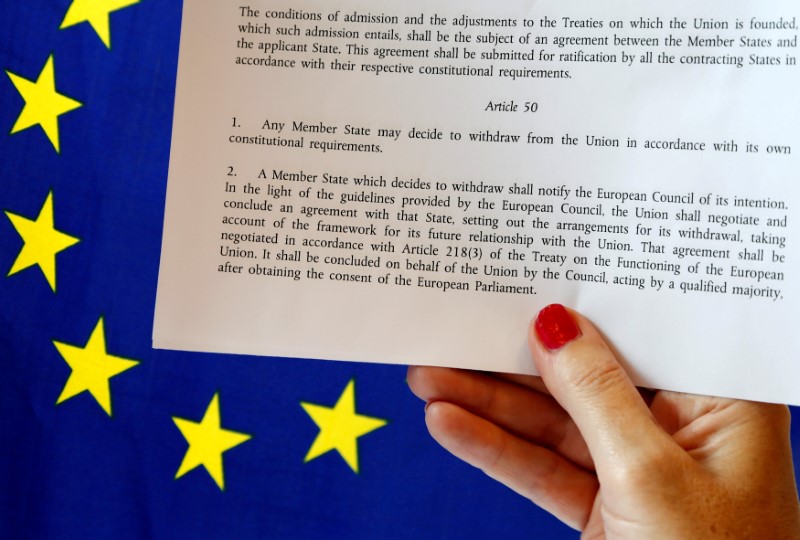By Michael Holden
LONDON (Reuters) - The United Kingdom's Supreme Court will deliver its ruling next Tuesday on whether Prime Minister Theresa May can begin leaving the European Union without parliament's assent, potentially giving lawmakers a chance to have a vote on Brexit.
May has said she would trigger Article 50 of the EU's Lisbon Treaty, the formal means of exiting the bloc, by the end of March and on Tuesday detailed her vision for a clean break with the EU by quitting its single market.
She believes the government can trigger Article 50 without needing lawmakers' approval using executive powers known as "royal prerogative", but last November London's High Court dealt her a blow by ruling it would be unlawful for her to act without parliament's approval.
The government appealed that decision to the Supreme Court, the United Kingdom's highest judicial body, which held four days of hearings in front of all its 11 justices last month. Their ruling will be handed down at 0930 GMT next Tuesday, the court said.
Many lawyers say May is likely to lose the case, and ministers have already prepared legislation to go before parliament if they are defeated.
The government's lawyer told the Supreme Court ministers could put forward a simple one-line bill giving May the authority to trigger Article 50 if the ruling went against them. Any such bill is likely to be put before the lower House of Commons the following week.
Sources from both May's ruling Conservatives and the opposition Labour Party have told Reuters there was scope for a bill to be accelerated through parliament, without restricting debate, to ensure it could pass before the end of March.
DEVOLVED ASSEMBLIES
Investors believed that giving lawmakers, the majority of whom backed staying in the EU, the chance to vote on Article 50 would lessen the chances of a "hard" Brexit where Britain gave up preferential access to the single market in favour of immigration curbs.
But, Labour cautiously welcomed elements of May's speech which clearly set out her intention for a clean break with the bloc and in a non-binding vote last December, lawmakers overwhelmingly voted to back a motion supporting her timetable.
"We won’t frustrate invoking Article 50, we've said that from the first day after the referendum result. On the other hand we want to hold the government's plans to account in parliament," a Labour source said.
May has also promised that the final deal struck with the EU after two years of divorce talks would be put to parliament.
While the thrust of the Supreme Court case centred on whether the British parliament had to give its assent, the judges also heard arguments from the Scottish government and lawyers for Northern Irish challengers that Britain's devolved assemblies must give their approval too.
If the court agrees, the current political crisis in Northern Ireland could derail May's timetable following the collapse of the province's power-sharing government.

Other legal challenges are also underway to argue that Britain would remain in the European Economic Area, which provides access to the single market even if it leaves the EU, and that Article 50 is reversible.